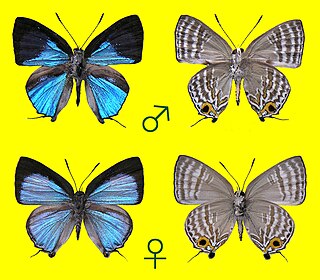
Lycaenidae is the second-largest family of butterflies, with over 6,000 species worldwide, whose members are also called gossamer-winged butterflies. They constitute about 30% of the known butterfly species.

Miletus symethus, the great brownie, is a small butterfly found in India that belongs to the lycaenids or blues family. The species was first described by Pieter Cramer in 1777.

Miletus is a genus of butterflies sometimes called brownies. Its species are found in the eastern Palearctic realm and the Indomalayan realm, and some stray east of the Wallace Line. The genus was erected by Jacob Hübner around 1819. Miletus is the type genus of the subfamily Miletinae.

Sinthusa is a genus of lycaenid butterflies, the sparks. They are small species with the male genitalia and secondary sexual characters of Virachola, but less robust and weaker in flight. The males are easily recognized, with the forewings oily indigo blue changing to shining blue in a side light and hindwings shining violet blue in all lights. The species of this genus are found in the Indomalayan realm. The genus was erected by Frederic Moore in 1884.

Miletinae is a subfamily of the family Lycaenidae of butterflies, commonly called harvesters and woolly legs, and virtually unique among butterflies in having predatory larvae. Miletinae are entirely aphytophagous. The ecology of the Miletinae is little understood, but adults and larvae live in association with ants, and most known species feed on Hemiptera, though some, like Liphyra, feed on the ants themselves. The butterflies, ants, and hemipterans, in some cases, seem to have complex symbiotic relationships benefiting all.

Allotinus is a genus of butterflies in the family Lycaenidae. The genus was erected by Cajetan Felder and Rudolf Felder in 1865. The members (species) of this genus are found in the Indomalayan realm.

Poritia is a genus of lycaenid butterflies. The species of this genus are found in the Indomalayan realm. Poritia was erected by Frederic Moore in 1887.

Catapaecilma is a genus of butterflies in the family Lycaenidae. The species of this genus are found in the Indomalayan realm.

Cebrella is a genus of butterflies in the family Lycaenidae. The genus was erected by John Nevill Eliot and Akito Kawazoe in 1983.

Deramas is a genus of butterflies in the family Lycaenidae erected by William Lucas Distant in 1886. The genus ranges from south Myanmar to Sundaland, the Philippines and Sulawesi. Most of the species are rare and endangered, and are confined to forest from sea level to about 5,000 feet (1,500 m).
Hypothecla is a genus of butterflies in the family Lycaenidae. The genus was erected by Georg Semper in 1890.

Lestranicus is a genus of butterflies in the family Lycaenidae. The genus was erected by John Nevill Eliot and Akito Kawazoe in 1983. The two species of this genus are found in the Indomalayan realm and the bordering Palearctic realm.

Philiris is a genus of butterflies in the family Lycaenidae. The species of this genus are found in the Australasian realm. Philiris was erected by Julius Röber in 1891. It is a speciose genus;Tite decided on 56 species Sands added an additional 11 species and placed the taxa into 21 species groups (broadly accepted by Parsons Most species are on New Guinea.Tite considered Philiris and Candalides Hübner, 1819 to be sisters. Eliot placed Philiris in Luciini Waterhouse & Lyell, 1914,

Simiskina is a genus of butterflies in the family Lycaenidae. The genus was erected by William Lucas Distant in 1886. The species of this genus are found in the Indomalayan realm.

Tajuria is an Indomalayan genus of butterflies in the family Lycaenidae.

Udara is a genus of butterflies in the family Lycaenidae. The species are found in the Indomalayan and the Australasian realms.

Rachana mioae is a butterfly of the family Lycaenidae first described by Hisakazu Hayashi in 1978. Eliotia mioaeH. Hayashi, 1978 was moved to Rachana, because Eliotia is the junior homonym of a genus of marine animals described in 1909.
Allotinus substrigosus is a butterfly in the family Lycaenidae. It was described by Moore in 1884. It is found in Asia.

Rachana jalindra, the banded royal, is a lycaenid or blue butterfly found in the Indomalayan realm. The species was first described by Thomas Horsfield in 1829.

Hypothecla astyla is a butterfly in the family Lycaenidae first described by Cajetan Felder and Rudolf Felder in 1862. It is found on the Philippines.

















